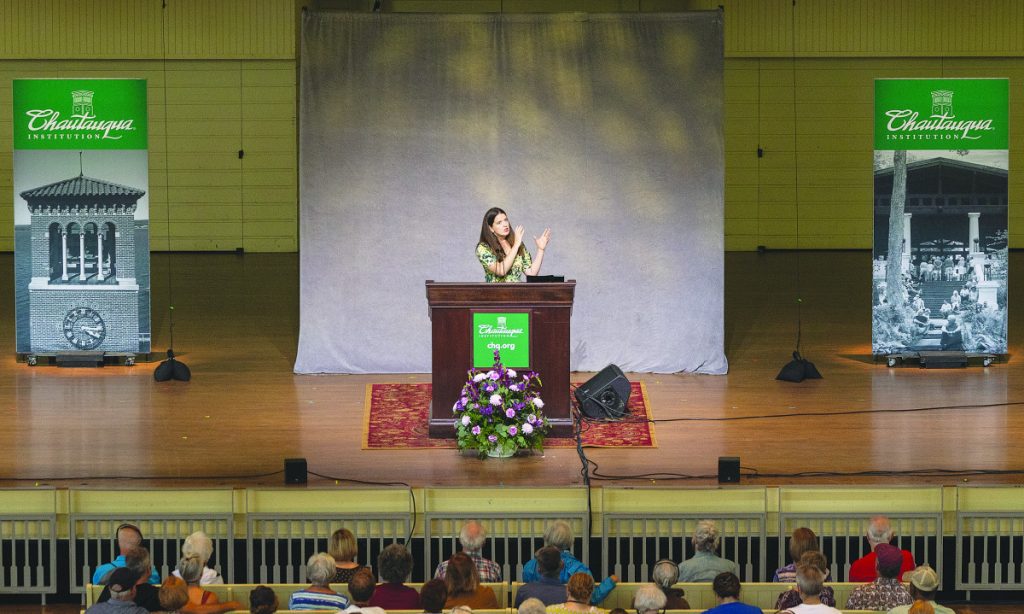
Alton Northup
Staff writer
“In its efforts to respond to the failures of institutions, and oh, there have been failures, we have turned to a more exhausting form of individualism,” said Kate Bowler. “We have tempted to do away with the church … only to reinscribe that meaning onto everything else.”
Bowler, an associate professor of the history of Christianity in North America at Duke Divinity School, spoke about decreasing association with a religion in the United States in favor of commercial individualism at 10:45 a.m. Tuesday in the Amphitheater, continuing the Chautauqua Lecture Series Week Four theme, “The State of Believing.”
For decades, Bowler said, the country has avoided the secular fate of other Western nations. Throughout the wild adolescence of Baby Boomers, the economic turmoil of the 1970s and the “greed is good” era of the 1980s, the United States was “largely defined by the stubborn persistence of spirituality, not its absence.”
But the 1990s proved to be a disruption to that trend – with the number of people who do not ascribe to a religious denomination sitting at 8%. By the 2000s, the “nones,” as Bowler called them, accounted for 18% of the population. In 2023, they make up nearly 25%.
“If you attend a congregation of any kind … you are now demographically, for the first time in a whole century, the minority,” she said.
How American society got to the point of potentially facing a radical cultural shift is complicated, but Bowler chalked it up to three moments in spiritual history.
At the height of the Cold War, Georgi Arbatov, a top adviser to Soviet President Mikhail Gorbachev, made his country’s goal clear.
“Our major secret weapon is to deprive you of an enemy,” Arbatov said.
That goal would be accomplished with the fall of the Soviet Union just three years later. Without the Cold War juxtaposition of the “God-fearing” Americans against the “Godless” Soviets, the stitchings of America’s spiritual fabric started fraying.
“It was much easier in that framework to define religion with democracy and human rights, and atheism as an ally of the evil empire,” Bowler said. “When the Berlin Wall came down and the Soviet Bloc evaporated, it became easier to say ‘I have no religion’ without sounding inherently un-American.”
The aftermath of Sept. 11 and the resulting War on Terror brought about a more intense challenge to religious attitudes, as the rising New Atheist movement argued religion itself was hostile to reason, science and progress.
“This protracted geopolitical crisis and the unpopular wars that followed caused many to doubt whether something about religion itself as a force for good was damaged in the process,” she said. “The notion of a Christian nation and its public reputation became more difficult to defend.”
Evangelicals, however, did not have much difficulty defending the concept of a Christian nation. For more than 50 years, Evangelical Christians have been the largest faith tradition in America, creating its own subculture, summer camps, universities and music.
Alarmed by social changes and a growing belief that mainstream culture and Christianity are pulling to the left, Evaneglicals have remained steadfast in galvanizing a conservative voter base, Bowler said, resulting in a symbiotic relationship with the Republican Party.
“Wave after wave of Evangelical culture wars began to produce a new generation of ex-Evangelicals,” she said.
Bowler could be considered an expert on Evangelicalism; she has written extensively on the subject since her first encounter with it in her hometown of Winnipeg, Ontario. In immersing herself in the belief, she said she started to notice its influence on growing secular culture in the United States.
After televangelist Joel Olsteen published his book, Your Best Life Now: 7 Steps to Living at Your Full Potential in 2004, people were talking about how to “live your best life” almost immediately. The book remained a bestseller for more than two years.
As fewer young people grow up in the church, Bowler argued they are not without religious beliefs. She said the daily devotional has been replaced with self-help books – a $12 billion industry turning cheap advice into paperbacks hoping to solve the problem of being human.
“The triumph of this paradigm is it neatly processes the American belief,” she said.
From an early age, Americans are told they can always score higher on a test, always lose more weight or always do their hair a little bit better. This new perspective of “living your best life” affirmed that perfection is a conceivable goal.
“It has taken every small hope and made all of us into televangelists in the gospel of good, better, best,” she said.
But this system is not sustainable, Bowler said. Because it portrays perfection as something obtainable, it forces people into hiding their struggles and their suffering. The exhaustion of reality, she said, requires more than self-help books.
“We have freighted our hopes and hobbies with the kind of existential weight that only God can bear,” she said. “So, next time someone says to you that the state of belief in America is no belief at all, I want you to shake your head. Something is carrying the weight of religion around here; look alive. We will see it everywhere.”




